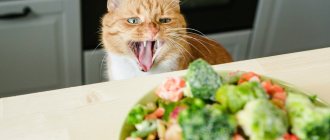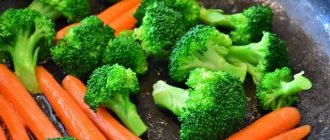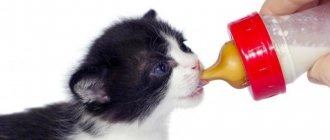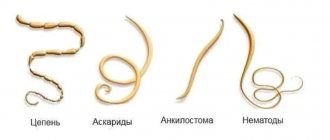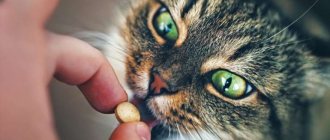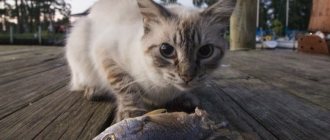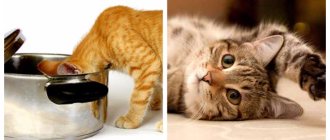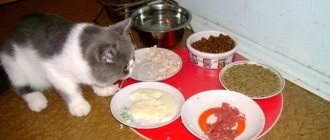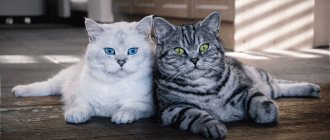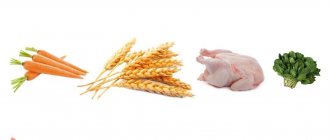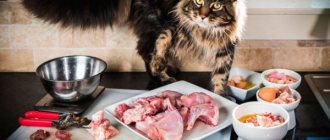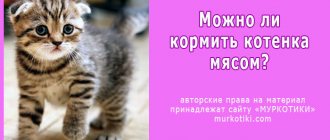What will you learn from the article?
- Prohibited foods for cats Products that should not be abused
Some owners mistakenly believe that picky and squeamish cats will never eat anything harmful or dangerous. Yes, cats will not eat spoiled meat, but they will gladly try canned tuna from the master’s table, and this is dangerous for them! This article describes in detail what cats should not eat.
There is a whole list of foods that are harmless and healthy for humans that cannot be fed to cats and kittens. Familiarize yourself with it, and be responsible - make sure the food is safe for your cat by offering her a bite from your plate.
Let's look at foods that kittens and adult pets should not eat.
Features of structure and natural nutrition
Felines naturally eat animal foods. Meat forms the basis of their diet. Only some species of wild cats eat fish and bird eggs. They are exclusively an addition to the diet and help diversify it.
Cats do not synthesize enzymes in their digestive tract that digest plant foods. The predator obtains all the substances produced by plants by eating the herbivore’s stomach. It contains plant residues that have already been processed with the necessary enzymes.
In rare cases, a cat will feast on plants. She does this in order to cleanse the intestines of hairballs and small undigested remains - skins, bones, feathers, claws. Some processes and feeding skills are “recorded” in domestic carnivores at the genetic level, while others they master during the learning process.
Therefore, the eating habits of pets are somewhat different from their counterparts living in the wild. It is believed that the cat will not eat harmful and spoiled foods. However, street animals eat in garbage dumps, and the food there is not the freshest. It’s true that such animals live 5 times less than pets.
In order for your pet to live as long as possible and have excellent health, its diet must meet certain requirements and consist only of healthy foods.
Special feed
Food manufacturers produce special diets for complete and balanced nutrition of cats:
- Monge - in most cases these are monoprotein pates made from beef, chicken, and duck. However, among them you can find canned tuna, vegetables and shrimp. They are safe and designed specifically for feeding sterilized animals.
- Carnilove is a dry food based on lamb, wild boar and poultry. However, the manufacturer also produces salmon-flavored mixtures, a fish that is allowed to be eaten by castrated cats.
- Royal Canin is one of the most popular pet food manufacturers, producing mainly dry food. They are well balanced and contain special additives for the prevention of urolithiasis.
All food can be purchased both in pet stores and on thematic Internet resources. However, before choosing such canned food for your pet, you need to consult a veterinarian.
Meat and offal
They are the basis of the diet and should make up 40-60% of the daily portion. Preference should be given to raw meat, since the cat’s gastrointestinal tract has all the necessary enzymes for its digestion and absorption. Fresh meat satisfies natural instincts, cleanses and strengthens teeth, and provides the body with healthy proteins.
Some albumins needed by the cat's body are not synthesized in the body, like in other carnivores. Therefore, the diet of a domestic cat should contain 2 times more animal proteins than, for example, dogs. But some types of meat and offal can pose a health risk to your domestic cat.
Fatty meats - pork, lamb - cause excess cholesterol, which causes atherosclerosis and heart disease. Thermally untreated meat may contain helminth eggs, toxins, and pathogens. Therefore, it needs to be frozen or boiled.
But proteins denatured under the influence of high temperature cannot fully ensure the processes of tissue synthesis. Preference should be given to frozen or tested fresh meat.
By-products are no less valuable for the cat’s body. Giblets are divided into 2 categories:
- The first includes the liver, kidneys, tongue, brains, and heart. In terms of the amount of protein they are not inferior to meat, they contain little fat and are easily digestible. They are subject to the same processing as meat and can replace it.
- The second category is the stomach, trachea, heads, ears, lungs, legs, tails. They are less valuable, but there are much more of them in finished feeds than category 1 by-products. After boiling, they can also be added to the cat’s food. However, you shouldn’t get carried away with them, despite their cheapness.
The liver and kidneys are natural filters, and their tissues accumulate toxins, antibiotics, and growth hormones, which are used in breeding poultry and livestock. They cause digestive disorders, diarrhea, and allergies.
They are light, contain little fat, and are not inferior in protein to veal tenderloin. Cats happily eat lungs, but if there is dysfunction of the joints, a tendency to dysplasia and salt deposition (gout), they and other by-products should not be given to the animal. They cause progression of the disease. For old animals, the amount of by-products should be limited as much as possible or eliminated altogether, especially liver.
Meat products
Sausages, sausages, pates and other meat products are very dangerous for the cat’s body. In addition to the fact that they contain hidden fats, they contain spices, large amounts of salt, preservatives, flavor enhancers, soy, starch, and dyes. All of them are harmful to domestic cats and cause obesity, heart and circulatory system diseases, diarrhea, allergies, and intoxication.
Even if an adult cat carries them in small quantities, they can become deadly for kittens and older animals. According to scientific research, frequent feeding of cats with sausage products increases the risk of pancreatic cancer by 15-20%.
Surprisingly, but...
Contrary to the stereotype that milk is a cat's favorite drink, it is worth noting that adult cats can do just fine without it. Lactose has a bad effect on a cat's stomach, and most of it is found in cow's milk, while goat and sheep milk are more beneficial for the pet.
Fresh fish should not be given to your cat because it may contain parasites. It’s good to give meat selectively. You should not give pork often because of its high fat content; you need to be careful with chicken bones, although a cat can enjoy them. Raw poultry meat may also contain parasites.
Fish
Despite the widespread belief that cats love fish, it should be given to the animal very carefully. River fish is strictly prohibited.
In addition to the fact that it may contain eggs and larvae of worms, it contains a large number of thin, sharp bones. It's difficult to get rid of them completely. Once in the esophagus and stomach, the bones can get stuck in the mucous membrane, injure it and cause inflammation, suppuration, and tissue necrosis.
Modern open reservoirs contain most of the periodic table. Harmful substances accumulate in the meat and bones of fish. Eating such a product will not add health to your pussy. But endogenous substances from raw fish also pose a danger to cat health:
- the enzyme thiaminase destroys vitamin B1;
- trimethylamine oxide reacts with iron, preventing its absorption;
- The “fish diet” disrupts the synthesis of vitamin K and the absorption of vitamin E.
As a result of hypovitaminosis, internal processes are disrupted, anemia, hemorrhage, brain damage, and infertility appear. Veterinarians especially do not recommend giving cats fish from the carp family. They have the highest thiamine content.
Sea fish and seafood contain large amounts of iodine. Animals need it. But cats are not able to absorb too much of it. Frequently feeding your pet fish and seafood causes hyperthyroidism.
Fish also contains a lot of phosphorus. If it is not compensated by the same amount of calcium, it begins to be deposited in the form of stones in the kidneys and bladder. The risk of developing urolithiasis increases in older and neutered cats.
It is better to give sea fish, completely deboned and boiled, since fish proteins are strong allergens.
Can cats have sprats in oil?
Cats love the smell of smoked fish and canned food. They especially like sprats, which should not be fed to pets often. Some pet owners advise giving this product to treat constipation in kitties. They have a laxative effect, but sprats should not be used for this purpose.
Fish has never been the basis of feeding. It should not be used in the diet more than twice a week; more frequent use has a negative effect on the kidneys. It is even more dangerous to feed your cat canned fish. Sprats are smoked, flavored with a lot of oil.
If cats eat canned food often, complications arise:
- hair loss due to an allergic reaction;
- urolithiasis or liver failure develop due to a lack of calcium and excess phosphorus in the body;
- muscle spasms and cramps are observed, as vitamin B is destroyed by thiamine.
Sweets, baked goods, baked goods
Cookies, sweets, chocolate, buns and pasta are a source of huge amounts of carbohydrates. They cause obesity, diabetes, caries and other pathologies in cats. A cat gets its energy from proteins. It is able to utilize carbohydrates, but in small quantities.
In the wild, cats consume no more than 5%. In ready-made dry food this amount increases to 20-30%. But there, foods containing carbohydrates are processed so that they are quickly absorbed. Thus, the manufacturer reduces the price of feed by reducing the amount of meat. Therefore, cats develop diarrhea, increased gas formation and fluid retention when exposed to certain types of food. Unprocessed carbohydrates from sweets and baked goods increase the risk of developing pathologies.
Natural chocolate is especially dangerous for cats. Cocoa beans contain caffeine and theobromine, which have a stimulating effect on the nervous system. A small piece of dark chocolate or chocolate candy can cause a heart attack, short-term neurological disorder, severe thirst, convulsions, and excessive agitation in your pet.
Why plant foods are not for cats
In nature, representatives of the cat family usually fed on small rodents, so plant foods entered their stomachs, unless the prey had previously had a hearty breakfast. But in any case, the toxic substances contained in the plant have already been neutralized by the rodent’s liver. Whereas in a cat, this organ is not used to coping with their toxic effects.
Cats living in private homes can heal themselves with the help of medicinal plants. It is more difficult for pets living in apartments - they do not have this opportunity, so they can only rely on the prudence of the owner.
Milk and dairy products
In mammals, which include domestic cats, milk is a necessary product only in the first months of life. It can be used in the preparation of milk porridges for up to six months. In adult cats, the level of lactase, an enzyme that digests milk proteins, decreases significantly. Therefore, feeding adult animals with milk causes vomiting, diarrhea and other dyspeptic disorders.
Casein in milk causes allergies. Also, herbicides and fertilizers come into milk from plant foods, and growth hormones and antibiotics from the animal’s blood. All this is harmful to the cat's health. Even pasteurized milk is harmful. Pasteurization reduces the absorption of calcium and changes the structure of substances and compounds. Once in the animal's body, they change the course of biochemical reactions and disrupt metabolic processes.
It is recommended to introduce fermented milk products into the diet of cats to strengthen bones and normalize intestinal microflora. However, with a high fat content, instead of benefit, the animal is at risk of heart attacks, obesity, and atherosclerosis.
Some owners like to pamper their pet with a piece or two of hard cheese. If the measure is followed, it is safe, but cheese contains a lot of salt, and casein can cause a serious allergic reaction.
What not to feed kittens
Babies and growing kittens need a special diet. Their body is not yet strong enough. Some foods can simply harm a delicate stomach, for example, raw fish. It is forbidden to feed a kitten the same things that cannot be fed to adult cats. The exceptions are goat milk, sour cream and homemade cheese. All products should be low in fat. They can be given to a baby up to 8 months.
You should absolutely not feed your kitten products that contain a lot of salt, spices and artificial additives. For him this food is unnatural. In addition, it leads to digestive disorders.
When it comes to professional food, you shouldn’t choose cheap brands. It is better to give kittens good balanced food. It does not contain any foods that should not be given to your cat.
Even though cats are quite picky eaters, they are easily tempted by treats. Before you treat your pet to something tasty, remember what foods should not be given to cats. If you suspect that your cat has eaten food that is unwanted or dangerous to her, rinse her stomach and induce vomiting. Be sure to contact your veterinarian afterwards.
In conclusion, we note that a natural-fed cat receives all the necessary substances. She needs treats only as a reward. SUPERPET diets are balanced, do not contain hazardous ingredients and are suitable for cats from three months of age.
Vegetables and fruits
A small amount of vegetables helps saturate the body with fibers that stimulate the evacuation function of the intestines, vitamins and elements. But they can also pose a danger to the cat’s health.
Potatoes, corn and bananas - the starch from these foods is not processed in the cat's body. It reduces intestinal motility, causing constipation and serves as a substrate for bacterial growth. These products cause fermentation in the intestines and the formation of large amounts of gas. The same effect is obtained when legumes are introduced into the diet - peas, soybeans, beans.
Other plants are also dangerous:
| Types of plant foods | Consequences of use |
| Fruits | Increased gas formation, obesity |
| Citruses, pineapple, kiwi | Vomiting, diarrhea |
| Grape | Severe poisoning |
| Persimmon | Enteritis |
| Rhubarb | Renal dysfunction, diarrhea |
| Nuts, spinach | Urolithiasis disease |
| Soybeans, alfalfa | Hormonal imbalance |
| Garlic, onion | Anemia |
| Nightshades (tomatoes, eggplants) | Poisoning. |
You should not exceed the amount of even healthy vegetables in your diet. They are mixed with meat and fish, since cats only rarely eat them with pleasure.
Food from your table
Under no circumstances should you give your pets any leftovers from your dinner! This is very dangerous for the health of your pets. The use of salt and spices can be very harmful to the animal, and excessive cooking destroys essential nutrients. Very harmful and even deadly foods are sausage, any fried foods, canned vegetables and fruits, and smoked foods.
Even for humans, these products are not very useful, but the cat’s body is much less adapted to such food. A cat can very easily become poisoned and die by eating mushrooms, a piece of lard, or fried meat. Coffee and alcoholic drinks are extremely dangerous for cats.
Cat food should not be salted or seasoned like human food. This can cause serious damage to the digestive system. Animals have enough of those organic and inorganic ones contained in the food itself. There is no need to reheat the food either; it can be slightly warmer than room temperature.
